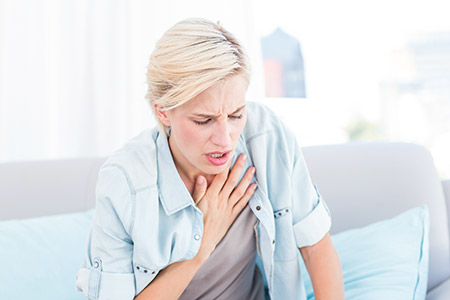Over 600,000 people die of heart disease each year in the United States, that’s 1 in every 4 deaths. Knowing the 4 Signs You Are Having A Heart Attack and what to do can save your life.
4 SIGNS YOU ARE HAVING A HEART ATTACK
The body will often warn you about things that are going wrong and with the heart there are usually 4 key signals or symptoms that often precede or accompany a heart attack.
- Chest Pain
- Shortness Of Breath
- Indigestion or Heartburn
- Nausea and Vomiting
1. Chest Pain

Chest Pain is the one symptom that we associate most often with a heart attack and there’s a good reason for that: It actually is the most common symptom.
However, chest pain can mean more than one thing, and it can manifest itself in many ways. There is one type of pain that occurs all over your chest. There is another type of pain that occurs just off to the left side or the center of the chest. It can also start in the jaw and radiate down the left arm. The pain can also occur at different intervals and different intensities. It might come and leave very suddenly or last for a few minutes or more. The discomfort can be mild, or it can be severe, and it can also feel like uncomfortable fullness, squeezing, or pressure.
When the chest pain is severe, it can manifest itself in what we’ve come to nickname “The Hollywood Heart Attack,” because it looks like the dramatic type of heart attack we see on TV and in the movies. But it’s important to understand that the pain doesn’t have to be as severe as that; it can be mild, especially at first, and so you may not realize anything serious at all is happening.
See Chest Pain And Heart Attacksfor more information on chest pain
2. Shortness of Breath

While most people find chest pain alarming, they are not aware that Shortness Of Breath, even in the absence of chest pain, can signal an impending heart attack. In fact, one study, published in The New England Journal of Medicine, found that of 18,000 patients referred for cardiac stress testing, those who experienced shortness of breath were three-to-five times more likely to die. This included some patients who reported no chest pain at all.
This shortness of breath can occur suddenly, right before or even during a heart attack. It can also provide you with an important clue that something is wrong with your heart that demands checking out.
3. Indigestion or Heartburn

One of the challenging things about chest pain is that it often doesn’t feel like chest pain. Sometimes it feels like Indigestion, or even Heartburn.
Take Jack, for instance. He’s a top-flight salesman with a heavy travel schedule. He was in the habit of closing a deal by going out for a big dinner, with a couple of scotch-and-sodas followed by a thick steak. So he wasn’t particularly surprised when he started experiencing indigestion. But on one occasion, it wasn’t indigestion; this was the early warning sign of an impending heart attack.
How is it that pain from your heart can be felt somewhere else? Because we don’t actually perceive pain directly. Even if you stub your toe, the discomfort you feel is first interpreted through our central nervous system, which is comprised of the brain, spinal cord, and nerve cells. Because the nerves in the stomach are located near the heart, it’s not surprising that such “signal confusion” sometimes occurs in the case of a heart attack.
4. Nausea and Vomiting

Nausea and Vomiting are often classified as “atypical” symptoms of heart attack, meaning they don’t usually occur. However, in the thousands of patients I’ve treated, I find that they are really not that uncommon at all.
Nausea and vomiting can occur alone, but they often also occur with other heart attack symptoms. Obviously, having any one of these symptoms does not necessarily mean you are having a heart attack. But if you believe you are having a heart attack, call 911 and ask to be taken to the nearest hospital.
OTHER SIGNS OF A HEART ATTACK
- Discomfort that spreads to the shoulders, arm, back, neck, or jaw
- Indigestion, heartburn, or a choking feeling
- Profuse sweating
- Rapid or irregular heartbeat
- Dizziness, weakness, or lightheadedness
- Vague, general feeling of illness
- Anxiety or a feeling of doom
- Passing out
Obviously, some of these are very general, and may indicate a less serious condition such as a respiratory infection or the flu. But they can occur with the four symptoms I’ve seen occur more commonly in the people I’ve treated over the years for heart attacks.
IMPORTANT: You should also know that if you’ve already had a heart attack, you are at increased risk to suffer another. The symptoms of another heart attack may be the same as the first, or they may be different, which is why it’s important to consider symptoms carefully, and not to assume that they are not coming from your heart.
